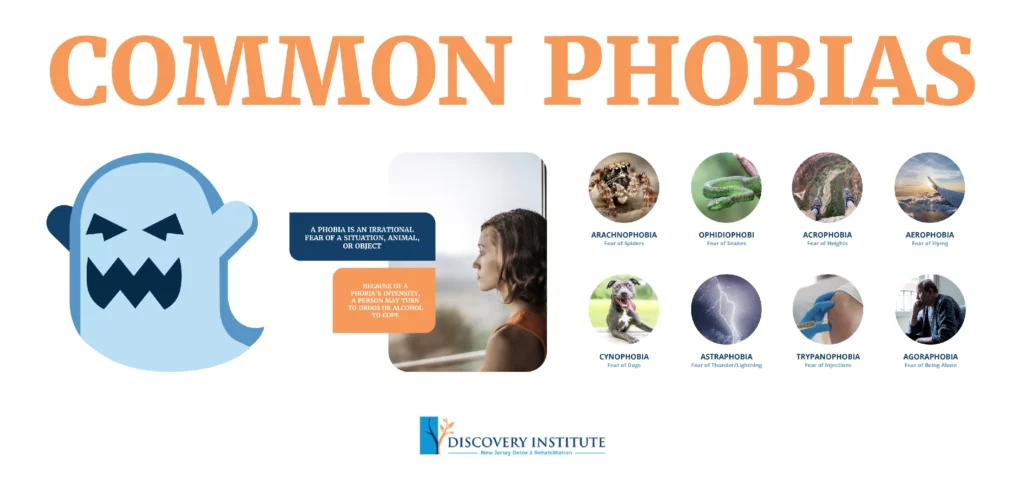Phobias and Addiction Treatment
When in real danger, fear is a natural response. On the other hand, a specific phobia is an unrealistic fear of an object or situation. This fear has little to do with reality. For this reason, treatment options, including therapy for phobias and medications for phobias, are beneficial.
Although some phobias are based on real experiences, they can become disproportionate to reality. Experiences that invoke phobias include spider bites, plane crashes, and being stuck in an elevator. Phobias interfere with daily life, specifically jobs, relationships, and social activities.
Substance use disorders also commonly co-occur with phobias. People with this type of mental illness may turn to drugs and alcohol as a means of trying to cope with and ease their symptoms. For this reason, the treatment of phobias should focus on dual diagnosis, not just one condition.
At Discovery Institute in Marlboro, New Jersey, our team of professional addiction specialists treats co-occurring disorders such as phobias and addiction.
What are Phobias?
A phobia is an irrational fear of a situation, animal, or object. Although phobias are overwhelming and stressful, they are unjustified and unreasonable. A person struggling with a phobia will avoid their fear at all costs. This avoidance can be self-destructive and restricting.
There are many different phobias. But, the most common types of phobias include specific phobias and social phobias. The types and examples are illustrated below.
Specific Phobias
Often co-occurring with other disorders, specific phobias are irrational fears that pose no actual threat. For instance, the common specific phobia of being trapped in small places is claustrophobia. With this phobia, people fear restricted movements, small places, and suffocation. Specific phobias often co-occur with generalized anxiety, post-traumatic stress disorder, and obsessive-compulsive disorder.
Common categories of specific phobias are:
- Situations such as going to school, enclosed places, and airplanes
- Nature such as heights and thunderstorms
- Animals or insects such as dogs and spiders
- Blood, injections, and injuries including needles, accidents, and medical procedures
- Others such as clowns, loud noises, choking, and vomiting
Specific phobias have their terms. These include acrophobia, the fear of heights, and arachnophobia, the fear of spiders. However, no matter the phobia, they have common reactions, including:
- Immediate, intense fear, panic, and anxiety when facing the fear or even thinking about it
- Being aware that phobias are irrational but being powerless in controlling them
- The closer the object or situation time, the greater the fear and panic
- Avoiding objects or situations at all cost
- The fear disrupts normal daily functions
- Physical reactions including trouble breathing, tight chest, rapid heartbeat, and sweating
- Feeling dizzy and nauseous around blood and injuries
Phobias in children can lead to tantrums, crying, clingy, and refusing to leave their parents.
Social Phobias
 Feeling nervous in some social situations is normal. For instance, giving a speech or going on a date can cause the “butterfly” feeling. However, with social phobia, everyday interactions can cause fear, anxiety, and feelings of being judged.
Feeling nervous in some social situations is normal. For instance, giving a speech or going on a date can cause the “butterfly” feeling. However, with social phobia, everyday interactions can cause fear, anxiety, and feelings of being judged.
Social phobia, also known as a social anxiety disorder, disrupts everyday life because of fear and anxiety. The severe stress of social phobia affects work, school, and relationships. But, the many phobia treatment options, such as therapy and medication for phobias, can help gain confidence hence improving social interactions.
Emotional and behavioral symptoms of social phobias include:
- Fear of situations where judgment may happen
- Fear of embarrassment or humiliation
- Fear of speaking to strangers
- Fear of being called out on looking anxious
- Fear of physical symptoms of phobias – blushing, sweating, shaky voice, and trembling
- Avoiding things out of embarrassment fears
- Fear of being the center of attention
- Intense anxiety before the feared event
- Staying in a social situation even though it causes fear and anxiety
- Analyzing every detail of the social situation and looking for flaws
- Expecting the worst consequence from a negative social situation
Physical symptoms of social phobias include:
- Blushing
- Sweating
- Trembling
- Fast heartbeat
- Nausea
- Trouble breathing
- Dizziness
- Mind goes blank
- Muscle tension
Common things hard to do with social phobias include:
- Going to work or school
- Dating
- Talking to strangers
- Attending parties
- Starting conversations
- Making eye contact
- Eating in front of people
- Using the public bathroom
- Entering a room when others are already seated

Signs of Drug and Alcohol Addiction to Cope With Mental Illness
Given how debilitating a phobia can be, it should come as no surprise that many people who suffer from these disorders commonly turn to drugs or alcohol to numb their fears and anxiety.
Addiction signs and symptoms include:
- Secrecy or lying about drugs
- Drug paraphernalia on display
- Erratic mood swings
- Weight loss or gain, sleeping more than usual or changing social groups
- Financial insecurity
The signs of an individual’s addiction differ depending on the severity of their addiction and the type of substance to which they are addicted.
Statistics About Phobias and Addiction
According to the National Institute of Mental Health, here are some statistics that help illustrate tthe co-occurrence of phobias and addiction.
- Most Americans report experiencing symptoms of phobia at age 7.
- Among people with phobias, it has been found that about 7% have also abused alcohol and that about 9% have also abused drugs.
- More than 8.5 percent of adult Americans struggle with specific phobia symptoms. The largest age group with phobias is 45 to 49-year-olds.
- Over 32 percent of adults with specific phobias receive treatment for phobias.
Phobias That Co-Occur With Addiction
Out of all the phobias discussed, some qualify as the most common phobias. According to Current Opinion in Psychiatry, the most common phobias revolve around animals, high places, closed places, being injured, and being alone. Although these are the most common phobias, they are not always the most debilitating.
Examples of Phobias Associated With Addiction
Phobias come in all shapes and sizes and are as unique as the people who have them. Here are some examples of phobias that co-occur with addiction:
- Addiction And Agoraphobia: Fear of unknown situations as well as a fear of leaving a comfortable situation, such as going outside of your home. People with agoraphobia can turn to drugs and alcohol as a way to temporarily cope with their debilitating symptoms.
- Addiction and Claustrophobia: Claustrophobia is a fear of being in small spaces. Someone suffering from this phobia may be able to avoid their triggers for the most part, but when they cannot, they may turn to drugs or alcohol to cope with their anxiety.
Other common phobias include:
- Arachnophobia – fear of spiders
- Ophidiophobia – fear of snakes
- Acrophobia – fear of heights
- Aerophobia – fear of flying
- Cynophobia – fear of dogs
- Astraphobia – fear of thunder and lightning
- Trypanophobia – fear of injections
- Agoraphobia – fear of being alone
- Mysophobia – fear of germs
Although these various phobias interfere with daily life, the treatment of phobias can lessen this interference. Treatments include therapy for phobias; however, medication for phobias may also help.
CONTACT US
Find out how we can help
Our compassionate counselors are standing by to answer any questions you may have. After helping thousands of people over the last 50 years, we have the resources to help you and your family and all your individual needs.
What Causes Phobias and Addiction to Co-Occur?
A phobia is most commonly developed between the ages of 15 and 20, though some do develop in childhood. There are, however, some other common risk factors to consider.
The following are risk factors for both addiction and phobia:
- A history of mental illness or substance abuse in the family
- Trauma
- High-stress situations
- Personality type
- The presence of other mental health disorders
A phobia is most commonly developed between the ages of 15 and 20, though some do develop in childhood. Many people can overcome their phobias with the right treatment. Others, sadly, may find themselves turning to drugs and alcohol as a coping mechanism until they become addicted.
The Most Common Phobias and Substance Abuse

Phobias are like other anxiety disorders. Specifically, phobias are often co-occurring with substance misuse and substance use disorder (SUD). People may use drugs and alcohol to ease their fears.
People may also use substances to cope with self-isolating depression. In the treatment of phobias, it can be challenging to differentiate between phobias symptoms and substance use disorders (SUDs). However, a thorough evaluation can help someone receive an accurate diagnosis and treatment plan.
How Are Co-Occurring Disorders Diagnosed?
A phobia is a serious disorder that can interfere with a person’s work, school, and home life. As a result, it is critical to obtain an accurate diagnosis. Phobias and other mental disorders, such as panic disorder, can share symptoms.
Each phobia has a unique set of criteria, according to the DSM. However, there are some overlapping criteria. Standard diagnostic criteria include:
- Life-Limiting – symptoms significantly impact life
- Avoidance – avoids feared situations and objects
- Anticipatory anxiety – focusing on future events causing extreme anxiety
The following methods are used to diagnose addiction and phobia:
- A thorough physical examination
- A thorough psychological examination
- Blood tests to rule out the presence of any other conditions or any other testing the clinician deems necessary in light of the patient’s symptoms (EKG, MRI, etc).
A visit to your clinician and possibly a couple of specialists will be required to diagnose both a phobia and substance addiction
How are Phobias and Addiction Treated?
It is critical to treat someone who has both a phobia and a substance addiction at the same time. Dual diagnosis treatment has been shown to be an effective method of treating both phobias and substance addiction at the same time while preventing relapse. Addiction and phobia dual diagnosis treatment may include:
- Detoxification under medical supervision
- Dual diagnosis group therapy
- Medication
- Exposure therapy
- Cognitive-behavioral therapy (CBT)
- Workshops for mindfulness and stress reduction
Understanding a person’s phobia will help guide their substance abuse treatment, and vice versa. Therapies beneficial to the treatment of phobias and substance abuse are the following:
- Cognitive-Behavioral Therapy (CBT) – Although CBT was developed for depression, it is helpful for the treatment of phobias and anxiety. It’s also useful in treating SUD. The goal of CBT is to change self-defeating thought patterns and unrealistic views of the world.
- Exposure Therapy – Slowly exposing people to their fear is exposure therapy. This exposure is done in a controlled environment. The goal of this therapy for phobias
- Holistic Therapy – Yoga, meditation, exercise, and other relaxation methods are types of holistic therapies. Holistic therapies in the treatment of phobias help reduce stress and lower the symptoms of anxiety.
What Types of Medications are Available for Phobias?
Pharmacotherapy – Medication for phobias are SSRI (selective serotonin reuptake inhibitor) antidepressants. However, benzodiazepine drugs are helpful on an as-needed basis who have specific situational anxiety. But, benzos are highly addictive. For this reason, controlled use is needed.
SSRI Medications for Phobias
SSRIs are a group of antidepressants. These drugs are useful in treating anxiety and social phobias. This medication for phobias changes serotonin levels in the brain, which controls moods. SSRIs for phobias include:
- Celexa (citalopram)
- Zoloft (sertraline)
- Prozac (fluoxetine)
- Paxil (paroxetine)
However, this medication for phobias has side effects such as:
- Headaches
- Nausea
- Sleep issues
Benzodiazepines for Treatment of Phobias
Because benzos are mild tranquilizers, they help reduce anxiety and treat phobias. But, most times, benzos are for short-term treatment of phobias. They are also given at the lowest dosage possible. Common benzos include:
- Valium (diazepam)
- Xanax (alprazolam)
- Klonopin (clonazepam)
- Ativan (lorazepam)
Side effects from low-dose benzos include:
- Depression
- Drowsiness
- Memory problems
- Next morning hangover
When to Seek Treatment for Phobias and Addiction?

Even though phobias are common, they don’t always significantly disrupt life or cause distress. For instance, a fear of snakes may not be an issue if a person lives in the city. However, living in a big city can be a problem if a person fears crowded places.
So, if a phobia doesn’t affect daily life, treatment isn’t necessary. But, avoidance of objects, activities, and situations because of fear interferes with daily life. For this reason, phobia treatment options are needed. Consider the treatment of phobias if:
- Fear, anxiety, and panic are intense and disabling
- Avoiding specific places and events because of fear
- Avoidance brings added stress
- Phobia lasts more than six months
There are various effective phobia treatment options. But, phobias also co-occur with other mental health disorders such as SUD. Therefore, the treatment of phobias requires comprehensive chronic treatment plans.
Finding Dual Diagnosis Treatment For Phobias and Addiction
If you or a loved one is currently suffering from both a phobia and a substance addiction, contact our helpline to locate a dual-diagnosis treatment program in your area. Dual diagnosis treatment is available in the following settings:
- Residential/inpatient treatment centers
- Outpatient treatment centers
Our compassionate counselors are standing by to answer any questions you may have. After helping thousands of people over the last 50 years, we have the resources to help you and your family and all your individual needs.
Treatment is Available at Discovery Institute
If you or a loved one struggles with substance use disorder and co-occurring phobias, we can help. Our New Jersey location provides comprehensive treatment plans to help members succeed in their recovery journey. Contact us today and find out how we can help. Your road to recovery is possible, and it is only a phone call away!
Dr. Joseph Ranieri D.O. earned his BS in Pharmacy at Temple University School of Pharmacy in 1981 and His Doctorate Degree in Osteopathic Medicine at the Philadelphia College of Osteopathic Medicine in 1991. He is Board Certified by the American Board of Family Medicine and a Diplomate of the American Board of Preventive Medicine Addiction Certification. Dr. Ranieri has lectured extensively to physicians, nurses, counselors and laypeople about the Disease of Addiction throughout New Jersey and Pennsylvania since 2012.



